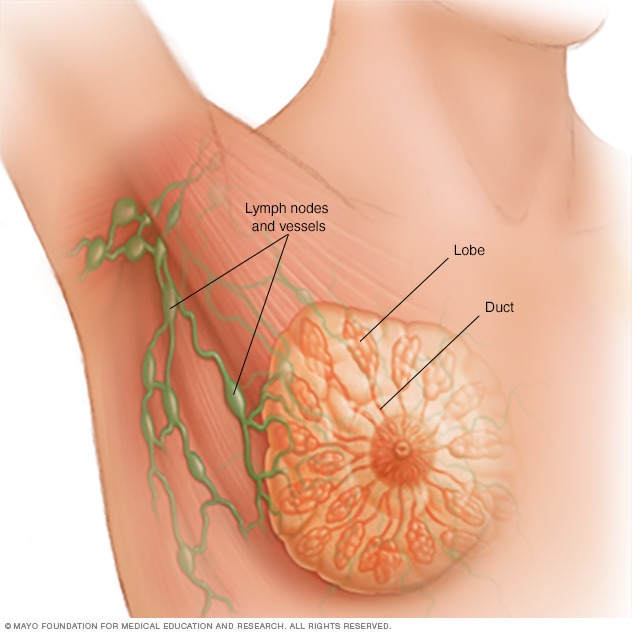概述
乳房解剖结构

乳房解剖结构
每侧乳房都有 15-20 个腺叶,排列的方式像雏菊的花瓣。腺叶还可以再分为更小的腺小叶,腺小叶可产生母乳喂养所需的乳汁。小乳管(称为乳导管)将乳汁运送至乳头下方的储乳器。
导管原位癌是一种极早期形式的乳腺癌。导管原位癌的癌细胞被限制在乳腺的乳管内。癌细胞尚未扩散到乳腺组织中。导管原位癌通常简称为 DCIS,有时称为非侵袭性、侵袭前或 0 期乳腺癌。
通常在乳腺 X 线摄影中发现 DCIS,该检查是乳腺癌筛查或乳腺肿块检查的一部分。DCIS 扩散和危及生命的风险较低,但确实需要进行评估并考虑采取治疗方案。
DCIS 的治疗通常需要手术。其他治疗方法可能会将手术与放射疗法或激素治疗结合起来。
症状
导管原位癌通常不会导致症状。这种早期形式的乳腺癌也被称为 DCIS。
DCIS 有时可能导致以下症状:
DCIS 通常在乳腺 X 线摄影中发现。它看起来像乳房组织中的微小钙斑。这些是钙沉积物,通常称为钙化。
何时就诊?
如果您发现乳房出现变化,请与医生或其他医疗护理专业人员约诊。要寻找的变化可能包括肿块、出现皱褶或其他异常状况的皮肤、皮下增厚区域以及乳头溢液。
询问医疗护理专业人员您应该在什么时候考虑进行乳腺癌筛查,以及应该多长时间复查一次。大多数医疗护理专业人员建议考虑从 40 岁开始进行常规乳腺癌筛查。
病因
尚不清楚导管原位癌(也称为 DCIS)的病因。
乳腺导管内的细胞 DNA 发生变化会导致这种早期形式的乳腺癌。细胞 DNA 含有指示细胞活动的指令。在健康细胞中,DNA 指令让细胞按设定速度生长和增殖。这些指令会指示细胞在设定的时间死亡。而在癌细胞中,DNA 的变化给出了不同的指令。这些变化会指示癌细胞快速产生更多细胞。在健康细胞应该死亡时,癌细胞仍继续存活。这会导致细胞过多。
在 DCIS 中,癌细胞还尚无能力突破乳腺导管并扩散到乳腺组织中。
医疗护理专业人员并不清楚哪些因素导致细胞发生变化,从而导致 DCIS。可能起作用的因素包括生活方式、环境和具有家族遗传性的 DNA 变化。
风险因素
有几个因素可能会增加患导管原位癌(也称为 DCIS)的风险。DCIS 是一种早期形式的乳腺癌。患乳腺癌的风险因素可能包括:
-
乳腺癌家族史。如果您的父母、兄弟姐妹或孩子患有乳腺癌,那么您出现乳腺癌的风险也会增加。如果您的家族成员有年轻时发生乳腺癌的病史,您的风险会更高。如果您有多位家人患有乳腺癌,您的风险也会更高。尽管如此,但大多数诊断患有乳腺癌的人,并没有这种疾病的家族史。
-
个人乳腺癌病史。如果您一侧乳房曾患过乳腺癌,则另一侧乳房患癌的风险会增加。
-
个人乳腺状况病史。某些乳腺状况标志着患乳腺癌的风险更高。这些状况包括小叶原位癌(也称为 LCIS)和乳腺非典型增生。如果乳房活检发现您有其中任何状况,那么您患乳腺癌的风险会增加。
-
月经在年龄较小时开始。月经初潮在 12 岁之前会增加患乳腺癌的风险。
-
绝经期在年龄较大时开始。绝经年龄在 55 岁之后会增加患乳腺癌的风险。
-
女性。与男性相比,女性患乳腺癌的可能性要大得多。每个人出生时都有一些乳腺组织,所以任何人都可能患乳腺癌。
-
致密乳腺组织。乳腺组织由脂肪组织和致密组织组成。致密组织由乳腺、乳腺导管和纤维组织构成。致密型乳房是指乳房中的致密组织多于脂肪组织。致密型乳房会增加乳腺 X 线摄影发现乳腺癌的难度。如果乳腺 X 线摄影显示您有致密型乳房,那么您有更高的乳腺癌风险。向您的医护团队咨询除乳腺 X 线摄影以外,您还可以接受什么检查来检查乳腺癌。
-
饮酒。饮酒会增加患乳腺癌的风险。
-
生第一胎时年龄较大。在 30 岁以后生育第一胎可能增加患乳腺癌的风险。
-
从未怀孕。怀孕一次或多次会降低患乳腺癌的风险。从未怀孕则会增加风险。
-
年龄增长。随着年龄的增长,患乳腺癌的风险也会增加。
-
遗传性 DNA 变化会增加患癌风险。某些 DNA 变化会增加患乳腺癌的风险,可能由父母遗传给孩子。最广为人知的变化是 BRCA1 和 BRCA2。这些变化可能大大增加您出现乳腺癌和其他癌症的风险,但并非所有具有这种 DNA 变化的人都会罹患癌症。
-
绝经期激素治疗。服用某些控制绝经期症状的激素治疗药物可能增加患乳腺癌的风险。这种风险与联合使用雌激素和孕酮的激素治疗药物有关。停止服用这些药物后,风险会降低。
-
肥胖症。肥胖症人群患乳腺癌的风险增加。
-
辐射暴露。如果您在儿童或青年时期接受过胸部放射治疗,您出现乳腺癌的风险更高。
预防
改变日常生活方式可能有助于降低患导管原位癌的风险。这种早期形式的乳腺癌也被称为 DCIS。为了降低患乳腺癌的风险,可以尝试:
咨询有关乳腺癌筛查的事宜
与医生或其他医疗护理专业人员讨论何时开始进行乳腺癌筛查。询问筛查有哪些益处和风险。与医生一起,您可以决定哪些乳腺癌筛查检测适合您。
通过乳房自检熟悉自己的乳房并提高乳房健康意识
您可以偶尔进行乳房自检来熟悉自己的乳房,并提高乳房健康意识。如果发现乳房有新的变化、肿块或其他异常迹象,请立即告知医疗护理专业人员。
乳房健康意识无法预防乳腺癌。但可能有助您更好地了解自己乳房的外观和感觉。这可能会让您更容易发现乳房的变化。
如果饮酒,适量即止。
如果饮酒,请限制饮酒量,每天不超过一杯。从预防乳腺癌的角度来说,没有安全的饮酒量。因此,如果您非常担忧患乳腺癌的风险,可以选择不饮酒。
每周多日进行锻炼
在一周的大多数日子里,争取每天至少运动 30 分钟。如果您最近没有怎么运动,请询问医疗护理专业人员是否可以运动,并慢慢开始。
在绝经期限制激素治疗
联合激素治疗可能增加患乳腺癌的风险。向医疗护理专业人员咨询激素治疗的益处和风险。
有些人在绝经期间会出现导致不适的症状。这些人可能愿意为了缓解不适而接受激素治疗的风险。为了降低患乳腺癌的风险,应在最短时间内使用尽量低剂量的激素治疗。
保持健康体重
如果您体重健康,请继续保持。如果您需要减重,请咨询医疗护理专业人员健康的减重方式。减少热量的摄入,并慢慢增加运动量。
Nov. 26, 2024